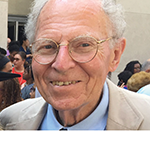Another rheumatologist elected to the AAP this year is Paul H. Plotz, MD, chief of the Arthritis and Rheumatism Branch and chief of the Connective Tissue Diseases Section of National Institute and Musculoskeletal and Skin Diseases (NIAMS) at the National Institutes of Health (NIH) in Bethesda, Md. “It had a real resonance for me to belong to this society,” says Dr. Plotz, who enjoyed seeing many old friends among the AAP members who welcomed him.
Like many rheumatologists of his generation, Dr. Plotz focused his research the immunology that followed the discovery of autoantibodies in key rheumatologic diseases such as rheumatoid arthritis and lupus. Dr. Plotz’s current research concerns the skeletal development of children with Pompe’s disease and the effects of enzyme replacement in fast-twitch muscles. “What’s fascinating is the way [the disease] isn’t behaving the way it should,” remarks Dr. Plotz. “In this illness, the principal problem is in muscle, and the downstream consequences of missing this enzyme are very different from what they appear to be in any of the other tissues.”
Dr. Plotz expressed tremendous gratitude for the freedom the NIH allows its researchers, and attributed the success of his research to the independence he has enjoyed there for over forty years. “There is a respect of the highest order for the wishes of hired scientists. . . If you’re given a lab and a budget, no one keeps you from doing what you want to do.”
Another AAP inductee is Jill P. Buyon, MD, professor of medicine and vice chair of the division of rheumatology in the department of medicine at New York University (NYU) School of Medicine and director of the Lupus Clinic at NYU’s Hospital for Joint Diseases in New York City.
Dr. Buyon’s research has focused on autoantibody-associated congenital heart block. She identified the spectrum of heart block, defined recurrence rates in the largest cohort to date, and proposed a pathogenetic cascade which links cardiocyte death to maternal anti-Ro/La antibodies and subsequent inflammation and scarring of the fetal conduction system. Dr. Buyon also established a national NIAMS-funded registry of families affected by this disease and provided internationally adopted guidelines on the approach to management of all anti-Ro positive pregnant women.
The fifth rheumatologist named to the AAP is Mark Reid Philips, MD, professor of medicine, cell biology, and pharmacology at NYU’s Langone Medical Center. Dr. Philips’s research focuses on the cell biology of GTPases—ubiquitous elements of signaling pathways, including those regulating cell growth and differentiation—which has potential implications for a wide variety of human diseases including inflammatory and autoimmune disorders, according to his lab Web site.
This is what I really love to do, and the fact that this is the highest recognition in the entire state university system that you can get means that you’ve been recognized for something that you value and they value.
—Ellen M. Ginzler, MD, on being named Distinguished Teaching Professor by SUNY Downstate

